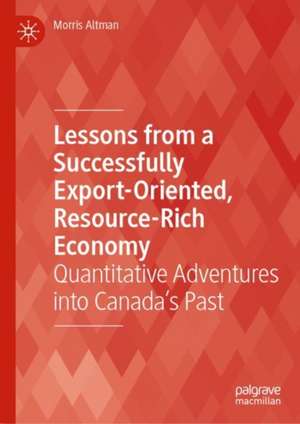Lessons from a Successfully Export-Oriented, Resource-Rich Economy: Quantitative Adventures into Canada’s Past
Autor Morris Altmanen Limba Engleză Hardback – 27 aug 2022
| Toate formatele și edițiile | Preț | Express |
|---|---|---|
| Paperback (1) | 648.24 lei 6-8 săpt. | |
| Springer International Publishing – 28 aug 2023 | 648.24 lei 6-8 săpt. | |
| Hardback (1) | 651.67 lei 6-8 săpt. | |
| Springer International Publishing – 27 aug 2022 | 651.67 lei 6-8 săpt. |
Preț: 651.67 lei
Preț vechi: 766.67 lei
-15% Nou
Puncte Express: 978
Preț estimativ în valută:
124.70€ • 130.52$ • 103.79£
124.70€ • 130.52$ • 103.79£
Carte tipărită la comandă
Livrare economică 31 martie-14 aprilie
Preluare comenzi: 021 569.72.76
Specificații
ISBN-13: 9783031038860
ISBN-10: 303103886X
Ilustrații: XXII, 465 p. 10 illus.
Dimensiuni: 148 x 210 mm
Greutate: 0.73 kg
Ediția:1st ed. 2022
Editura: Springer International Publishing
Colecția Palgrave Macmillan
Locul publicării:Cham, Switzerland
ISBN-10: 303103886X
Ilustrații: XXII, 465 p. 10 illus.
Dimensiuni: 148 x 210 mm
Greutate: 0.73 kg
Ediția:1st ed. 2022
Editura: Springer International Publishing
Colecția Palgrave Macmillan
Locul publicării:Cham, Switzerland
Cuprins
1 Introduction: Myth and Reality in Canadian Economic History.- 2 Back to the Future: Reflections on the Canadian Economy in International Context.- 3 Growth Theory and Economic History: A Staple Perspective.- 4 Economic Growth and Development in Early Canada.- 5 The Economic Impact of the Seigniorial Tenure in Early Canada.- 6 Quebec Agriculture in the Mid-Nineteenth Century: Comparing French Canadian and Non-French Farmers.- 7 Economic Development with High Wages: Economic Development in Central Canadian Manufacturing at the Turn of the Twentieth Century.- 8 Resource Endowments and Economic Development: Why Location and the Bounties of Nature Can't Explain Quebec's Laggard Economic Performance in the Pre-World War One Period.- 9 Railways as an Engine of Economic Growth? Who Benefited from the Canadian Railway Boom?.- 10 Manufacturing Growth in Canada and the Canadian Wheat Boom: New Light on an Old Question.- 11 New Historical Canadian Output Estimates: Implications for an Understanding of Canadian Economic Development, 1870-1926.- 12 How Long Did Canadian Workers Actually Work? The Struggle for a Shorter Work Week and Workers Standard Of Living Before the Great Depression.- 13 Gender Pay Inequality and Occupational Change in Canada, in the Early Twentieth Century.- 14 On the Natural Intelligence of Women: How the Feminization of Clerical Work Contributed to Gender Pay Equality in Early Twentieth Century Canada.
Notă biografică
Morris Altman is Chair Professor and Dean University of Dundee School of Business, Scotland, United Kingdom and Professor Emeritus at the University of Saskatchewan, Canada. He is a past president of the Society for the Advancement of Behavioral Economics and of the Association for Social Economics.
Textul de pe ultima copertă
A major theme of this book is that, contrary to what many experts believe, being endowed with a plenitude of natural resources is not a curse: rather it provides a potential advantage, if capitalized by the well-endowed economy. Much depends on the institutions that help frame the decision-making process that affects the process of growth and development. Canada is an example of a successful export-oriented economy. And, its export-orientation has been a focal point of discussion and debate, going way back to discussions of the early fur trade, the fishing industry, wheat farming, and mining and oil and gas exploration. Unlike other economies well-endowed with natural resources, Canada does not appear to be at all cursed, but rather blessed with natural resource abundance. This book, which ranges from the late seventeenth to the early twentieth century, provides insights from Canadian economic history on how such abundance can be a handmaiden of successful growth and development. From this perspective, the natural resource curse appears to be more of a ‘man-made’ phenomenon than anything else. This book also investigates aspects of gender inequality in Canada as well as the evolution of hours worked as it intersects with worker preferences and ‘market forces’. The narratives in this book are contextualised by the construction of new or significantly revised data sets, which speaks to the importance of data construction to robust economic analysis and economic history.
Morris Altman is Chair Professor and Dean University of Dundee School of Business, Scotland, United Kingdom and Professor Emeritus at the University of Saskatchewan, Canada. He is a past president of the Society for the Advancement of Behavioral Economics and of the Association for Social Economics.
Caracteristici
Provides insights from Canadian economic history Investigates aspects of gender inequality in Canada as well as the evolution of hours worked Presents Canada as an example of a successful export-oriented economy
